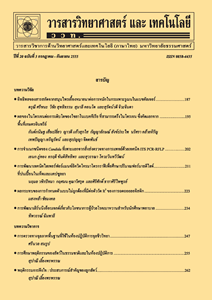ผลของกำลังไฟฟ้าต่อโครงสร้างของฟิล์มบางเซอร์โคเนียม ไททาเนต ที่เคลือบด้วยวิธีดีซี แมกนีตรอน โคสปัตเตอริง
Main Article Content
Abstract
Abstract
Zirconium titanate (ZrTiO4) thin films were deposited on glass slides, stainless steel and silicon wafer by DC reactive magnetron co-sputtering method. The effect of powers on the structure of the films were investigated. The crystal structure was characterized by XRD. The surface morphologies and thickness were evaluated by AFM and FE-SEM respectively. The results show that the films coated with crystalline increase the power (Zr : Ti). When Zirconium titanate thin films were coated at low powers, found that films have an amorphous structure. After the power increased (Zr : Ti) up to 900 : 1200 without heating the film has an orthogonal crystalline planar structure (111) corresponds to the thickness and roughness of the films. When increased power (Zr : Ti), the coated film has increase thickness and decrease roughness because of the high-energy coating process.
Keywords: thin film; zirconium titanate; power; sputtering
Article Details
References
[2] Bokhimi X, Morales A, Novaro O, Portillab, M., Lópezc, T., Tzompantzic, F., Gómezc, R., 1998, Tetragonal nanophase stabili-zation in nondoped sol-gel zirconia prepared with different hydrolysis catalysts, J. Solid State Chem. 135: 28-35.
[3] Carp, O., Huisman, C.L. and Reller, A., 2004, Photoinduced reactivity of titanium dioxide, Prog. Solid State Chem. 32: 33-177.
[4] Reddy, B.M. and Khan, A., 2005, Recent advances on TiO2-ZrO2 mixed oxides as catalysts and catalyst supports, Catal. Rev. Sci. Eng. 47: 257-296.
[5] Bavya Devi, K., Singh, K. and Rajendran, N., 2011, Sol-gel synthesis and characterisation of nanoporous zirconium titanate coated on 316 L SS for biomedical applications, J. Sol-Gel Sci. Technol. 59: 513-520.
[6] Pamu, D., Sudheendran, K., Ghanashyam Krishna, M. and James Raju, K.C., 2010, Dielectric properties of ambient temperature grown nanocrystalline ZrTiO4 thin films using DC magnetron sputtering, Mater. Sci. Eng. B. 168: 208-213.
[7] Hsu, C.H. and Lin, S.Y., 2013, Characterization of ZrTiO4 thin films prepared by sol-gel method, Mater. Sci. Semicond. Proc. 16: 1262-1266.
[8] Paksunchai, C., Denchitcharoen, S., Chaiyakun, S. and Limsuwan, P., 2014, Growth an characterization of nano-structured TiCrN films prepared by DC magnetron cosputtering, J. Nanomaterials Volume 2014, Article ID 609482, 9 p.
[9] ชีวารัตน์ ม่วงพัฒน์, 2544, การสร้างและศึกษาลักษณะของอิเลคโทรดประเภทฟิล์มบางโปร่งแสง, วิทยานิพนธ์ปริญญาโท, มหาวิทยาลัยเทคโนโลยีพระจอมเกล้าธนบุรี, กรุงเทพฯ.


